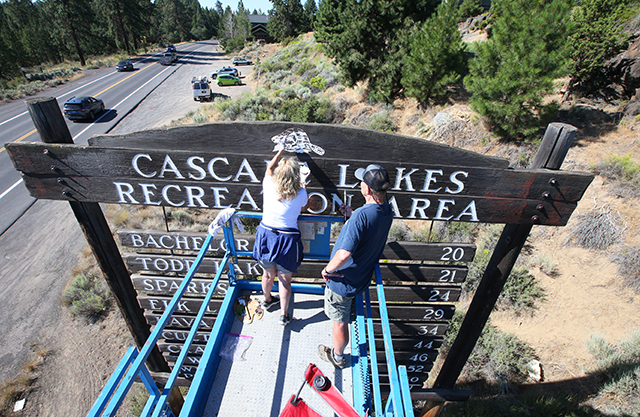Voters say no to Bend-La Pine Schools levy. Now what?
Published 5:30 am Friday, May 24, 2024

- Bend-La Pine Schools students sit on a school bus in August.
Voters rejected Bend-La Pine Schools’ local option levy in Tuesday’s primary, leaving the district to decide how to follow through on previous warnings that it would be forced to cut staff and increase class sizes in the next two years.
The district’s budget will shrink by 3% next year, which includes trimming 58 positions through attrition, or resignations and retirements. The district’s levy would have filled in gaps from the expiration of federal pandemic relief funds this September. But in explaining the levy before the primary, the district also said it would be forced to cut 120 positions in the 2025-26 school year if the levy failed to pass.
Trending
“It was a clear message from our community that this ask at this moment in time isn’t the right ask,” said Superintendent Steve Cook.
The levy, which would have charged $1 for every $1,000 of assessed property value for five years, would have raised $21 million in the first year for the district. Bend-La Pine Schools calculated it would have cost the owner of a home assessed at $239,000, $239 a year. The levy would have been used to hire staff, expand academic classes and hire counselors and educational assistants for student support.
The district will examine what went wrong: whether the district’s priorities resonated with voters, whether the amount was too much, whether the timing was wrong and whether the levy was communicated effectively.
The district’s polling demonstrated support, and it will be important to figure out the differences between the polling and the actual outcome, said Cook.
“We heard loud and clear that this is not the right time, but I think it’s important to note that 42% of our community did believe this was the right time, and I’m grateful for that support, and I’m grateful for our staff,” said Cook. “I do recognize that 57% of the voters said this is not OK with us, and so we heard that message as well.”
The district will now work on the budget for the 2024-25 school year, said Cook. The school board will decide whether it is interested in pursuing the levy at another time, though Cook said no discussion has happened on whether it will be on the November ballot.
Trending
Bend-La Pine’s budget for 2024-25 did not take the levy into account and does not need to be reworked.
The reduction for next year includes a 10% decrease in overall discretionary spending for schools.
The 58 positions will be cut proportionally across all job categories for next year, including support staff, educators, administrators and confidential staff. Cut positions are determined based on where the district has flexibility.
“Principals will significantly feel both that, and we’ll have classrooms that will feel that, and principals will feel that reduction in discretionary spending too,” said Cook.
Funding is budgeted and held in reserve for positions, even if no one is in the role. Therefore, some of the 58 positions that will be cut may not have assigned staff.
Bend-La Pine Schools is also gearing up for the legislative session next spring to discuss whether education is being adequately funded.
“I do not believe we are experiencing an adequate funding level,” said Cook. “We’re truly getting in line and saying we believe that there’s more dollars needed and required to meet the expectation of what’s coming and happening in our schools.”
Cook said a positive start would be to agree on the actual cost to run schools today, since there is disagreement throughout the state.
“It’s a very complex math problem, but right now demonstrating the way they’re doing the math and the way we’re doing the math, there’s a gap,” he said. “That to me is important, and then that feeds into the governor’s recommended budget, and that feeds into the conversation that happens between the legislators as they determine the budget for the entire state.”
Next school year will be tougher
“I’m disappointed for the kids of the district,” said John Rexford, a member of the Quality Education Commission, which determines how much the state should be spending on students for a quality education. “If you look at who has a local option, it tends to be districts with more value, more wealth in their districts. If anything, it tends to reinforce some of the inequities of the system.”
Voters he spoke to were concerned over not understanding how the funding would be used, said Rexford, a former Bend-La Pine administrator.
“Elections tend to be litmus tests on how districts are doing in the community, and it feels like the community’s got some concerns that they’re expressing through their ballot votes,” said Rexford.
Bend Education Association President Sarah Barclay said the union was disappointed the community did not support the levy. Teachers are upset with the increased workload next year and the loss of colleagues and supports.
“This was a solution that supported our community and our students, and I wish the community would have come alongside,” said Barclay. “General sadness that things are going to be harder next year, that’s what I’ve been hearing from teachers.”
With contract negotiations reopening next spring, Barclay said the union plans to wait for more information from the 2025-27 biennium to see how that influences bargaining.
Read more: Catholic high school to open in Central Oregon in fall 2025
Debbie Christian, Oregon School Employees Association president, said the union will continue to inform state leaders about the need for additional funding.
“The local option learning levy had the potential to add some additional much-needed support staff around the district,” wrote Christian in an email. “Without that funding, the leadership of the classified staff will work in partnership with the district administration to find innovative ways to move forward while best serving the needs of our students and staff.”







